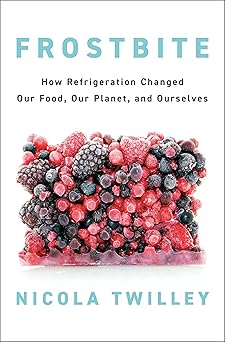
Frostbite is a book that delves into the fascinating world of refrigeration, taking readers on a journey from its early days as a scientific mystery to its current status as a global infrastructure that has transformed our relationship with food. The author, Nicola Twilley, explores the evolution of refrigeration and its impact on our health, farms, kitchens, and cities. She reveals that nearly three-quarters of everything we eat is now processed, shipped, stored, and sold under refrigeration, and that this network of thermal control is essential to make sense of our food system.
As Twilley takes us on this tour, we visit off-the-beaten-path landmarks such as Missouri's subterranean cheese caves, the banana-ripening rooms of New York City, and the vast refrigerated tanks that store the nation's orange juice reserves. We learn about the banana that has traveled from Ecuador to Shanghai in just a few days, and how tomatoes can be grown and harvested in England, even in the dead of winter. We also discover the fascinating history of refrigeration, from the early experiments with ice and snow to the development of the first refrigerators. Twilley's enthusiasm and curiosity make this book an engaging and entertaining read, as she reveals the transformative impact of refrigeration on our lives.
The book also delves into the challenges and consequences of our dependence on refrigeration. Twilley explores the impact on our health and the environment, and asks whether we can reduce our reliance on this technology. She examines the benefits of refrigeration, such as increased food safety, but also highlights the costs, including the loss of connection to our food and the contribution to climate change. The book makes a compelling case for a recalibration of our relationship with the fridge, and how our future might depend on it. Through Frostbite, Twilley has written a deeply researched and reported book that is both a tribute to the power of science and a warning about the importance of considering the consequences of our actions.
I recently had the pleasure of reading a fascinating book that took me on a journey through the world of refrigeration. As I turned the pages, I couldn't help but think of all the times I've huddled around a warm fireplace on a cold winter's night, or opened the door to a fridge to grab a snack on a hot summer's day. The book made me realize just how much of an impact refrigeration has had on our daily lives, and how it has transformed the way we live, eat, and interact with the world around us.
The author's enthusiasm and curiosity are contagious, as she takes us on a tour of off-the-beaten-path landmarks and shares fascinating stories about the history of refrigeration. I was amazed to learn about the banana that travels from Ecuador to Shanghai in just a few days, and how tomatoes can be grown and harvested in England, even in the dead of winter. The author's passion for the subject shines through on every page, making this book an engaging and entertaining read. As I read, I found myself wondering about the everyday appliances in my own home, and how they play a crucial role in keeping my food fresh and safe to eat.
As I delved deeper into the book, I began to appreciate the complexity of the relationship between refrigeration and our health and environment. The author examines the benefits of refrigeration, such as increased food safety, but also highlights the costs, including the loss of connection to our food and the contribution to climate change. Her warnings about the importance of recalibrating our relationship with the fridge are both timely and thought-provoking. Ultimately, the book made me realize just how much I take for granted the convenience of refrigeration, and how much I need to think about the broader implications of our daily actions.
Rating: 4.2 / 5.0
I recently finished reading a book that has made me think about the world of refrigeration in a whole new way. I rate it 4 out of 5 stars, as it was a fascinating and engaging read that took me on a journey from the early days of refrigeration to its current status as a global infrastructure that has transformed our lives. The author's enthusiasm and curiosity are contagious, and I loved learning about the history of refrigeration and its impact on our health, farms, kitchens, and cities. The book is well-researched and reported, and the author raises important questions about the consequences of our dependence on refrigeration. I found myself wondering about the everyday appliances in my home and how they play a crucial role in keeping my food fresh and safe to eat.